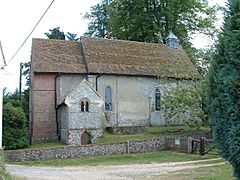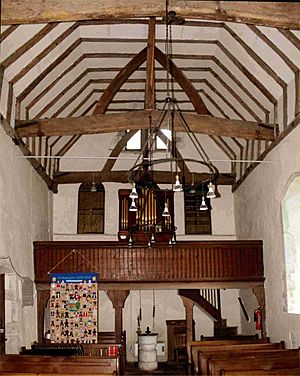Corhampton Church facts for kids
Quick facts for kids Corhampton Church |
|
|---|---|

Viewed from the north
|
|
| 50°58′44.76″N 1°07′56.82″W / 50.9791000°N 1.1324500°W | |
| OS grid reference | SU 610 203 |
| Location | Corhampton, Hampshire |
| Country | United Kingdom |
| Denomination | Church of England |
| History | |
| Founded | c. 1020 |
| Architecture | |
| Heritage designation | Grade I |
| Designated | 6 March 1967 |
| Administration | |
| Diocese | Diocese of Portsmouth |
Corhampton Church is an Anglican church in the village of Corhampton, in Hampshire, England. It's a bit unusual because it doesn't have a special saint's name. It's part of the Diocese of Portsmouth, which is like a church district. This church was built a very long time ago, in the early 1000s! It's so old and important that it's a 'Grade I listed building'.
Contents
Exploring Corhampton Church
The church sits on a small hill right by the River Meon. It was built around the year 1020. Experts say it's an "almost complete two-cell Saxon church," which means it has two main parts and is very old.
Ancient Features
Look for a stone sundial on the right side of the main entrance. This is a special Saxon "tide dial" that told time using the sun. Inside, you can see the original Saxon arch that separates the main part of the church from the altar area. This is called the chancel arch.
Later Additions and Changes
In the back part of the church, there's a stone seat that was added around the 1200s. The small room where priests get ready, called the vestry, and the main entrance porch were built later. The rail around the altar is from the 1700s. There's also a gallery at the west end of the church that was built in the 1800s. The very back part of the church, the east end of the chancel, was rebuilt with bricks in 1855.
Restorations and Repairs
The church has been repaired and updated over the years. In 1905, Sir Thomas Jackson helped restore it. This included the top of the west gable, which has a cool brick and flint pattern. More restoration work was done in 1999 to keep the old building in good shape.
Hidden Art: Wall Paintings
Faint medieval wall paintings were found in the 1800s. You can still see them if you look closely!
- On the west side of the chancel arch, there's a painting showing the story of the expulsion from the Garden of Eden.
- On the north, south, and west walls of the chancel, there are paintings that tell legendary stories from the life of St Swithun.
See also
 | Georgia Louise Harris Brown |
 | Julian Abele |
 | Norma Merrick Sklarek |
 | William Sidney Pittman |


